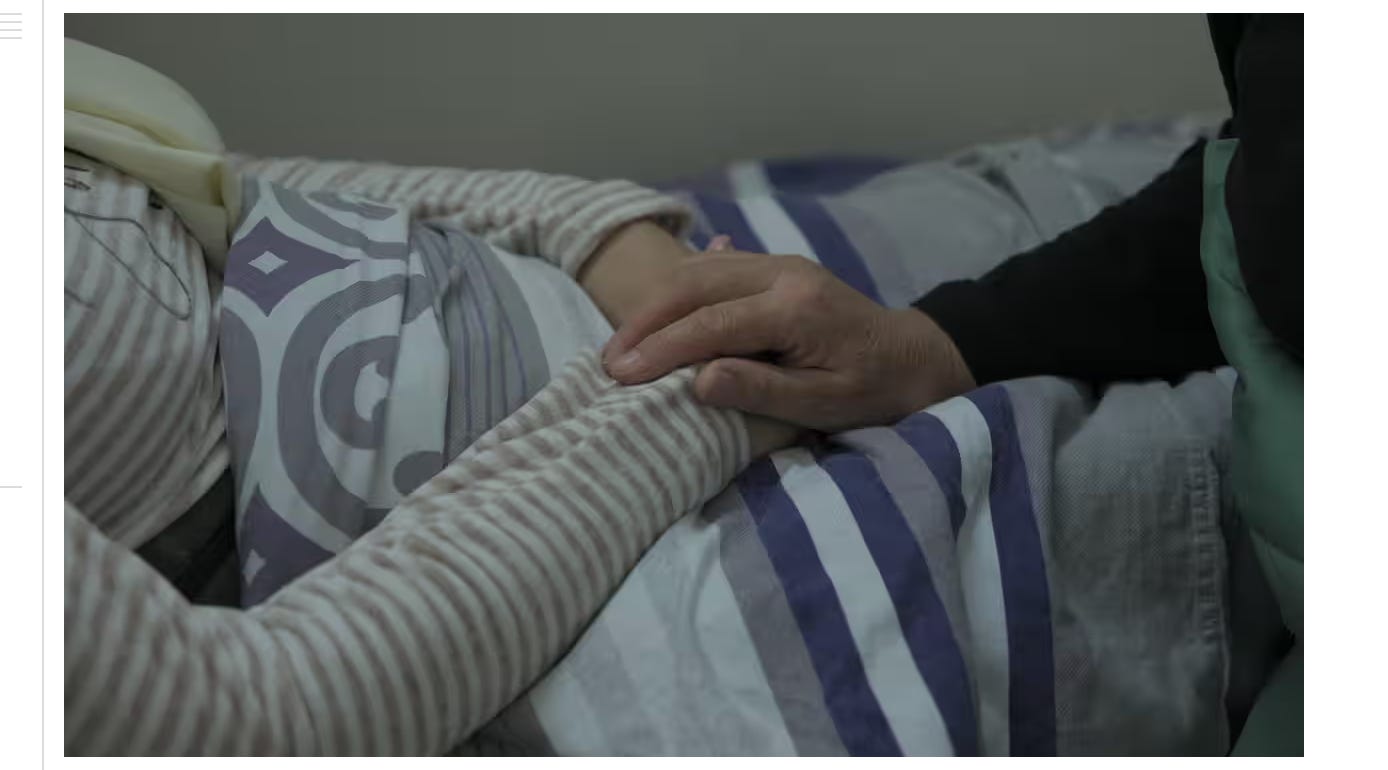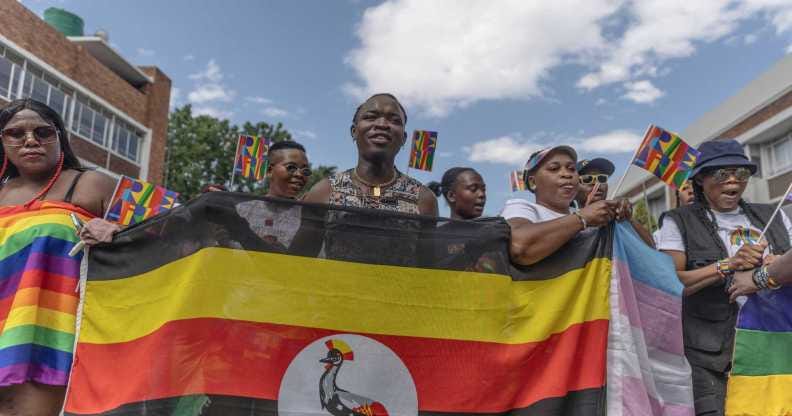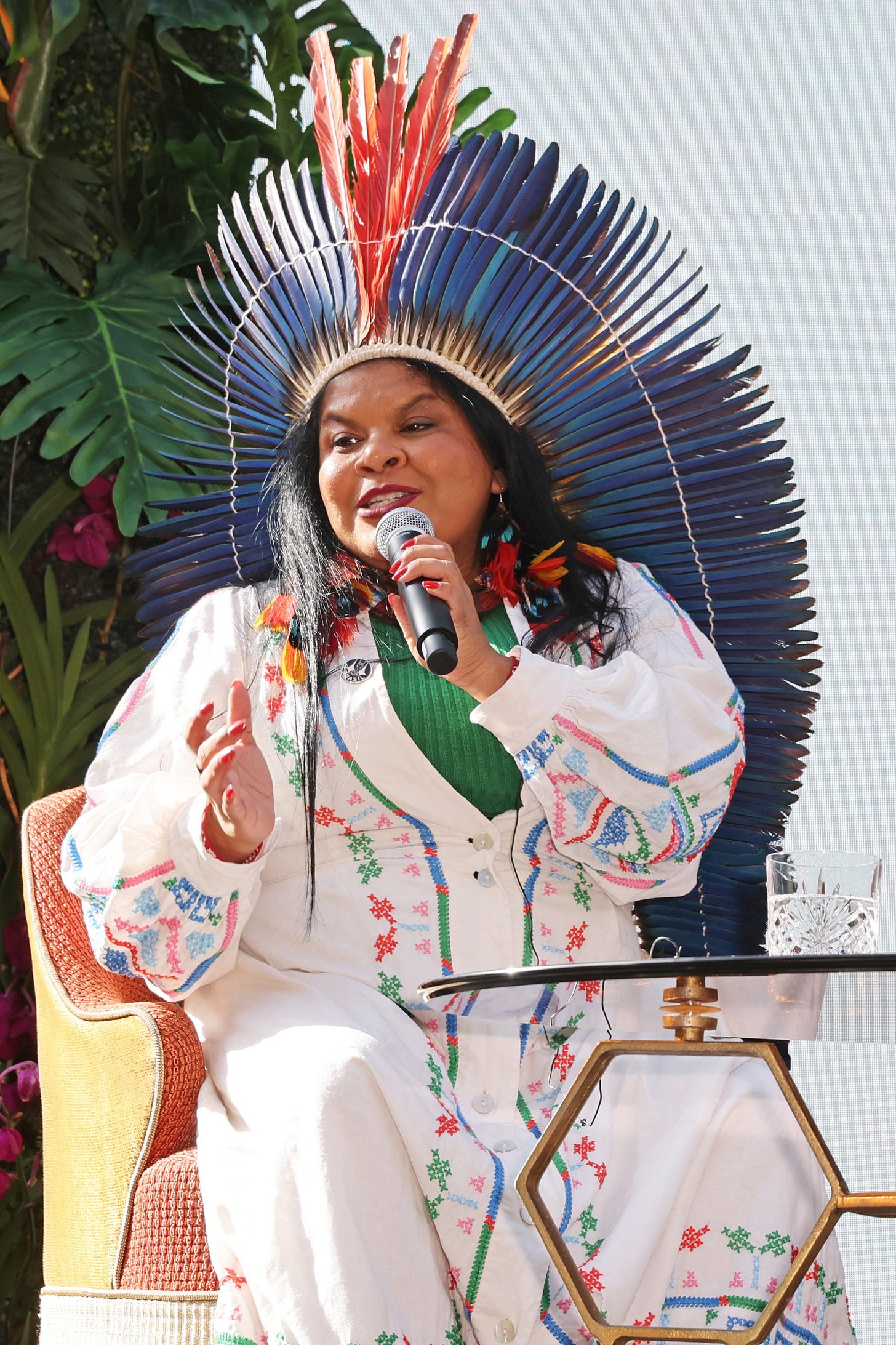Global Roundup: Kyrgyzstan GBV Survivor, South Africa Pride March for Uganda, Brazil Minister of Indigenous Peoples, Caribbean Women Revive Seed Work, Teen on Trans Joy
Curated by FG Contributor Samiha Hossain
Asel Nogoibaeva was viciously attacked by her ex-husband, despite reporting death threats to the police and his conviction for raping her. Photograph: Aigerim Turgunbaeva
CW: Gender-based Violence
Asel Nogoibaeva’s face was mutilated by her ex-husband last month after he turned longstanding abuse and threats into a vicious attack at the home she shared with her sons. The perpetrator, Azamat Estebesov, is now in prison, but Nogoibaeva is sad and angry that he was not jailed earlier. Instead, he had been given probationary sentences for previous threats, rape and violence against her.
Why in Kyrgyzstan should all cases concerning violence against women be resolved only after someone suffers, dies or becomes crippled for life? Does the judicial system even work? Why should we seek protection from journalists, society? -Asel Nogoibaeva
Nogoibaeva’s is just the latest of many similar cases of femicide and violence against women in Kyrgyzstan. And activists say public indifference is only exacerbating the problem. Campaigners at the Femicide in Kyrgyzstan project have identified at least 300 murders of women – at the hands of their husbands, boyfriends or former partners – between 2008 and 2020. In 70% of the cases, the killer attempted to dispose of the body to hide the crime, they said. In 2022, only 2,709 of 6,580 registered domestic violence cases went to trial.
Nogoibaeva will need to have several operations in Kyrgyzstan before, she hopes, raising the money through crowdfunding to have treatment from plastic surgery specialists in Turkey. Estebesov is now in prison after the court cancelled his probationary sentence for his previous attacks and jailed him for eight years. The latest attack on Nogoibaeva could lead to his sentence being extended. Nogoibaeva’s lawyers and relatives are calling for an investigation into the actions of the judge who released Estebesov. They also want an explanation as to why police ignored her complaints after he had broken the terms of five restraining orders in the past year. Nogoibaeva’s mother says only public outrage could change the culture of violence in the country.
Some MPs say we should not give interviews and not talk about what happened. Why should we be silent? After all, it is the judicial system that is to blame for the fact that my daughter went through so much and was on the verge of death. The judge must be punished. -Tinatin Kataganova, Nogoibaeva’s mother
This year Johannesburg Pride marched for Uganda’s LGBTQ+ community (GUILLEM SARTORIO/AFP via Getty Images)
The Johannesburg Pride last weekend dedicated this year’s march to LGBTQ+ people living in Uganda, who face the world’s harshest anti-gay laws under Uganda’s draconian Anti-Homosexuality Bill. The 34th Johannesburg Pride was estimated to have a 24,000 strong crowd.
Signed into law in May, the archaic legislation in Uganda doubles down on already harsh punishments for LGBTQ+ people – where same-sex sexual activity is illegal – by issuing life imprisonment for same-sex sexual activity and the death penalty for “aggravated homosexuality”. The new crime of ‘aggravated homosexuality’ sees people sentenced to death for having sex with people who are disabled, HIV positive, have mental health issues or those who are over the age of 75, amongst other categories. Alongside this, people who are found to “promote” or “normalise” homosexuality face up to 20 years in prison.
We are very far away from creating an inclusive society where children, the youth, and adults are totally accepted for their authentic self. At the end of the day, Pride is very relevant if you look what is happening not just in South Africa but Africa. The sentiment that it is un-African to be gay is at its height. -Kaye Ally, Johannesburg Pride organiser
Mandela Swali, a 25-year-old Ugandan gay man headed up the parade, after only being in South Africa for a month. Swali, who donned glitter and the Ugandan flag, said he fled the country after he was arrested for having sex with his boyfriend.
Sonia Guajajara, Minister of Indigenous Peoples of Brazil, speaks at The Caring Family Foundation's Indigenous Voices breakfast at Annabel's on Sept. 25, 2023 in London. Dave Benett—Getty Images/The Caring Family Foundation
Sônia Guajajara, 49, is Brazil’s first ever minister of Indigenous peoples. Guajajara’s career is defined by a number of remarkable firsts. Born to illiterate parents on Araribóia land in the Amazon, in the northeastern Brazilian state of Maranhão, Guajajara left her city to study and earned a degree in literature and nursing. Since then, she became a symbol of resistance against the oppression of Indigenous people, and in 2018, she became the first Indigenous woman in Brazil to appear on a presidential ticket. Guajajara spoke to TIME through a translator about the new ministry’s progress so far, and what her priorities are looking ahead.
Being minister is a great opportunity for the Indigenous peoples to really participate in political debate but also it's also a window into being open to break with preconceived ideas, with prejudice, and to be able to help. -Sônia Guajajara
Guajajara speaks about her priorities and mentions securing the territories of the Indigenous people, protecting the territories and environment, and making sure that there is security for the Indigenous peoples within the territories and to manage the practices that they already have in place. She also discusses how despite increased representation for Indigenous people, there is still a lot of resistance and lack of understanding, particularly by the decision makers. She highlights the role of women in the fight against climate change.
We're really promoting a core amongst Indigenous women, and getting Indigenous women to organize and mobilize to really provide elements to the fight against climate change. We're seeing a lot of sort of protagonism in this regard, but also amongst the youth. -Sônia Guajajara
For COP30, the ministry wants to really increase Indigenous participation in decision making spaces. They particularly want to increase the participation of women thinking specifically of the COP 28 [this year] in Dubai. Next year, they hope to hold a women's meeting—including women from several different parts of the world. This would be for women, by women, and in preparation of a greater call by Indigenous women to have a debate with women from all over the world for COP30, according to Guajajara
Louise Edwards has been making jewellery from tamarind seeds for more than 50 years. Photograph: Botanique Studios & Thomas Barzilay Freund
For a little more than 50 years, Louise Edwards has been collecting tamarind seeds that grow wild on the Caribbean island of Antiguato to create earrings, mats and belts. Edwards grew up surrounded by women stitching the seeds, but today she is one of only five remaining master artisans on the island, all in their 70s. With so few craftspeople left, this unique part of Caribbean culture risks being lost.
Anne Jonas, secretary to the governor general of Antigua and Barbuda, with the help of Barbara Paca, the country’s cultural envoy, have applied for funding to expand free workshops to teach seed art. In 2017, Jonas founded Botaniqué Studios, dedicated to revitalising the practice.
It tells a powerful story of how we have overcome our challenges and are now at a place where we are developing our nation … and creating economic opportunities for women. -Anne Jonas
It takes Edwards an hour to make earrings, but more intricate pieces, such as placemats, can take a week. Young people are often reluctant of how laborious the process is but the workshops are renewing interest. Denise Walcott, 47, went to her first workshop in June with her 16-year-old daughter, who now loves seed work.
I can’t remember it being this beautiful. This is an Antiguan culture and it should be a way of life for us. It is something that is empowering for us to use as an avenue to go along with our tourism industry. -Denise Walcott
The Sisters of Perpetual Indulgence showed trans pride in a San Diego parade. (Howard Lipin / San Diego Union-Tribune)
Alessandra Kahn, a high school senior in Los Angeles writes about trans joy in Los Angeles Times. Kahn starts with recent headlines such as Ohio lawmakers approving a bill to outlaw gender-affirming care and bar trans women from competing in women’s sports as well as brands like Nike, Pantene and Bud Light facing backlash for using trans people in their ad.
But that’s only half the story. When transgender people have access to gender-affirming resources and a supportive community, being trans is actually a joyful thing. -Alessandra Kahn
Kahn shares the joy felt as a child expressing femininity. As Kahn got older, Khan became conscious and started to develop feelings of shame. Khan found the courage to go on puberty blockers and start taking estrogen at the age of 14.
It was exciting and validating to look in the mirror each day and see a body in which I gradually felt more comfortable and myself. Not only did the distress begin to lessen, but a new feeling emerged: elation with whom I was becoming. At last, I was reclaiming the trans joy I had abandoned during childhood simply because I didn’t know I had a right to it. -Alessandra Kahn
Kahn emphasizes the impact of feeling accepted and being surrounded by supportive people. Khan also mentions how the increased rate of mental illnesses leads to the misconception that transness is to blame when in reality it is about the negative societal treatment the trans community faces.
Today, I look in the mirror and am not filled with distress over the body I inhabit. Rather, I feel feminine, beautiful, empowered…Without the unconditional support of my family and community, and without access to lifesaving gender-affirming care, I wouldn’t have the privilege of self-love and resonance between body and mind. Trans joy should not be a rarity. It should be the norm. -Alessandra Kahn
Samiha Hossain (she/her) is an aspiring urban planner studying at Toronto Metropolitan University. Throughout the years, she has worked in nonprofits with survivors of sexual violence and youth. Samiha firmly believes in the power of connecting with people and listening to their stories to create solidarity and heal as a community. She loves learning about the diverse forms of feminist resistance around the world.






